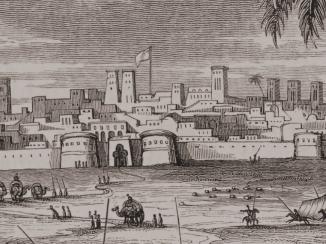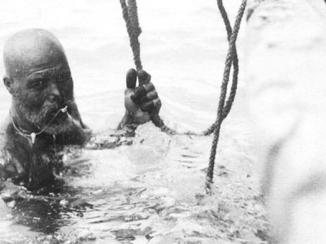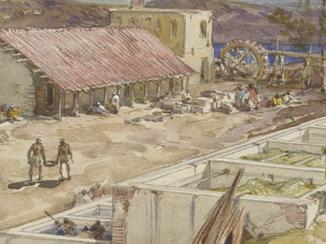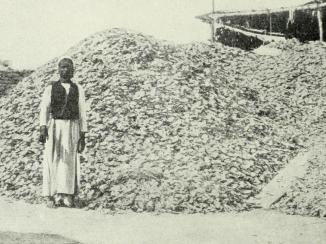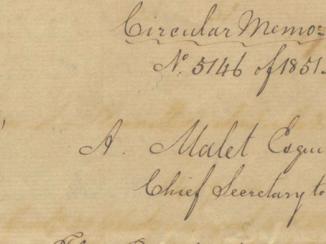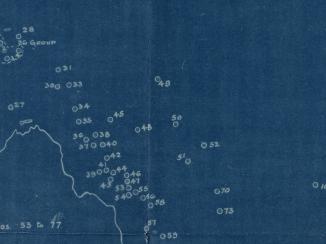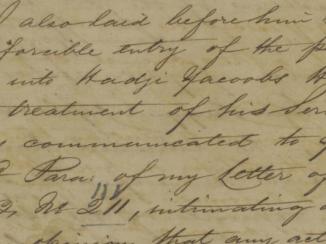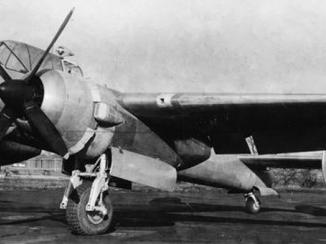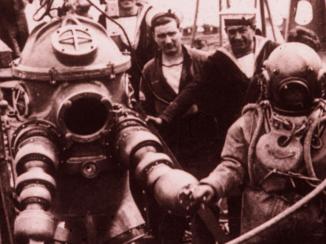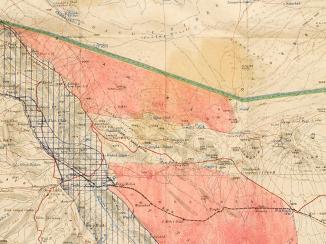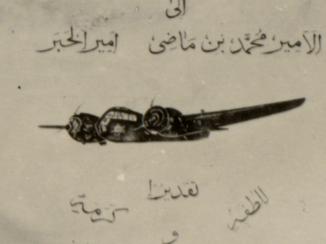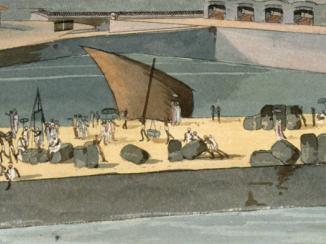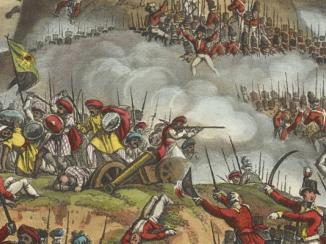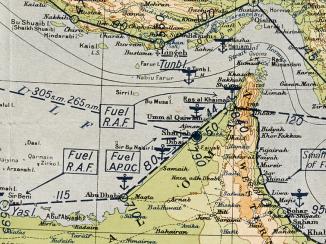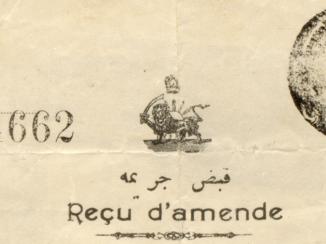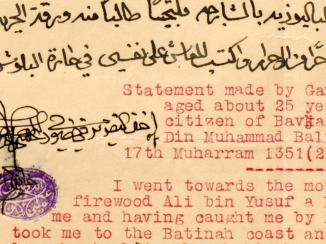Overview
In the Bahrain Political Agency An office of the East India Company and, later, of the British Raj, headed by an agent. Records of the India Office The department of the British Government to which the Government of India reported between 1858 and 1947. The successor to the Court of Directors. Records, there are nearly 150 confidential files dedicated to the Second World War, comprising 18,000 pages of content. These files were formerly organised under two subject headings: ‘File 28 Second World War’ (IOR/R/15/2/651-765) and ‘File 29 War: Food Supplies’ (IOR/R/15/2/766-794).
The files show that in spite of there being no military action around the shores of the Gulf throughout the War (save an audacious raid undertaken by three Italian bombers in October 1940) the region was significantly affected by the conflict. From the wide range of material covered, a number of key themes emerge.
1. The British Government’s efforts to defend its hegemony in the Gulf and protect its status as the region’s dominant imperial power
In response to the declaration of war in September 1939, the British Government introduced an emergency Order in Council A regulation issued by the sovereign of the United Kingdom on the advice of the Privy Council. for the Gulf, which enabled British administrators to impose laws and legislation along the Arab coast of the Gulf as required.
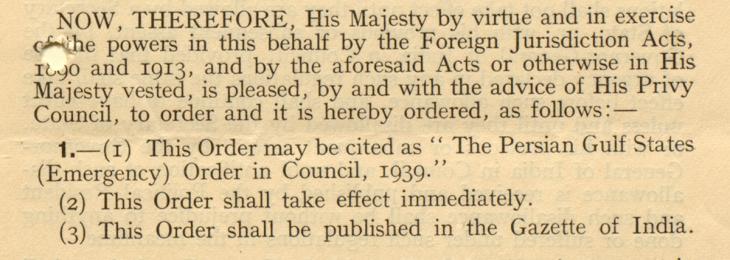
The appointment at Bahrain of a Defence Officer, as well as the deployment of both a Special Police Force and a Defence Force, combined with the recruitment for National Service, helped to bridge the gap between political and military control. Further defence measures were taken to protect the islands against attack from the air.
- ‘File 28/1 E Defence Officer, Persian Gulf. Station Commander Bahrain’ (IOR/R/15/2/656)
- ‘File 28/1 W (Bahrain Defence) N.C.O. – ‘Iraq levy officer’ (IOR/R/15/2/674)
- ‘File 28/1 G Bahrain Special Police’ (IOR/R/15/2/657)
- ‘File 28/55 Provision of machine guns for Bahrain police’ (IOR/R/15/2/746)
- ‘File 28/56 Motor cycles for Bahrain police’ (IOR/R/15/2/747)
- ‘File 28/1 D Local Volunteer Defence Force. British N.C.O. Instructors for Defence Force’ (IOR/R/15/2/655)
- ‘File 28/57 I Volunteers for national service’ (IOR/R/15/2/748)
- ‘File 28/57 II Volunteers for national service’ (IOR/R/15/2/749)
- ‘File 28/16 I Defence measures in the Gulf – Bahrain’ (IOR/R/15/2/703)
- ‘File 28/75 Defence policy for the Gulf’ (IOR/R/15/2/762)
- ‘File 28/1 I Defence against parachutists, obstruction of aerodromes and landing grounds, etc’ (IOR/R/15/2/659)
- ‘File 28/1 P Visit of enemy aircraft to Bahrain’ (IOR/R/15/2/669)
- ‘File 28/13 Black out and A.R.P. [Air Raid Precaution] measures in Bahrain’ (IOR/R/15/2/699)
More dramatic measures for maintaining British control in the Gulf followed. In May 1941, fearing Axis influences in the country, British forces invaded and reoccupied Iraq, restoring their ally ‘Abd al-Ilah to power. In August of the same year, British and Soviet forces invaded neutral Iran, forcing the abdication of the Shah, Reza Shah Pahlavi, and securing Iran’s oilfields for the Allies.
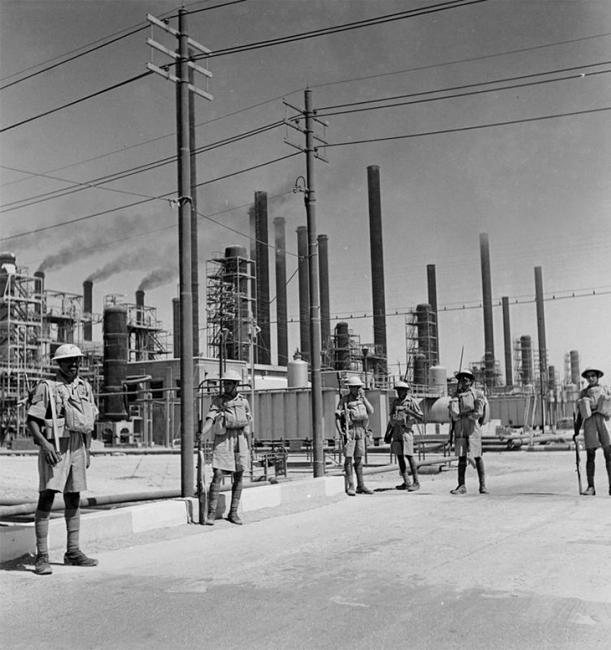
2. Propaganda, public opinion and anti-British sentiment
The propaganda war in the Persian Gulf The historical term used to describe the body of water between the Arabian Peninsula and Iran. largely took place over the airwaves, with British, Italian and German radio broadcasting propaganda messages in Arabic. British officials closely monitored propaganda and the sabotage of mail, while following local opinion in Bahrain. Individuals deemed suspicious or likely to harbour anti-British sentiments were also watched.
- ‘File 28/7 I War: Propaganda: local opinion’ (IOR/R/15/2/687)
- ‘File 28/7 II War: Propaganda – Local Opinion’ (IOR/R/15/2/688)
- ‘File 28/7 III Public opinion and general publicity’ (IOR/R/15/2/689)
- ‘File 28/10 (a) War. Foreigners, Anti-British Activities, etc. Father Irzio Luigi Magliacani (Roman Catholic Priest in Bahrain)’ (IOR/R/15/2/692)
- ‘File 28/10-(c) Anti-British Activities of Abdullah bin Faris, Secretary of the Shaikh of Sharjah’ (IOR/R/15/2/694)
- ‘File 28/10-(d) Tirath Das (Agent of Messrs. Dhamanmal Issardas in Dubai)’ (IOR/R/15/2/695)
- ‘File 28/10-(e) War. St. John Philby’ (IOR/R/15/2/696)
- ‘File 28/10-(f) Italian on board “Helka”’ (IOR/R/15/2/697)
- ‘File 28/18 Sabotage smuggling etc of mail’ (IOR/R/15/2/709)
3. Shipping restrictions and food shortages in the Gulf
Restrictions on shipping led to a severe shortage of basic commodities such as tea, coffee, rice and grain in the Gulf region. Contraband controls, quotas, export licenses, rationing and price controls were introduced in an effort to prevent smuggling and black market profiteering.
- ‘File 28/12 Establishment of Contraband Control Centre’ (IOR/R/15/2/698)
- ‘File 28/5 (a) I War. Proposed extension of export licensing system’ (IOR/R/15/2/684)
- ‘File 28/5 (a) II War. Proped Extention [sic] of Export Licences System. (Monthly Statements of Imports & Exports on main Commodity into & from Bahrain & the Trucial Coast)’ (IOR/R/15/2/685)
- ‘File 29/20 I Bahrein & Trucial Coast Stock Position and Statement of Bahrain Imports, Exports and re-exports of certain foodstuffs’ (IOR/R/15/2/773)
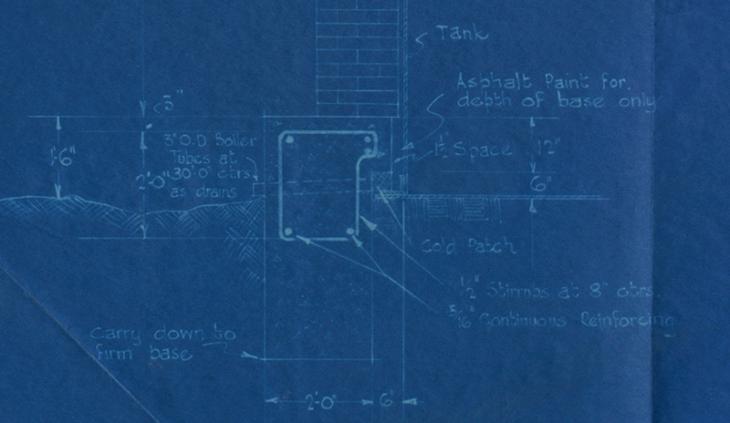
4. The importance of – and risk to – petroleum production at Bahrain
Fears of sabotage and air raids against Bahrain’s petroleum facilities led to a comprehensive programme of defensive measures taken to protect oil production at Bahrain. This included the proposed destruction of oil wells and refining facilities, should they fall into enemy hands.
- ‘File 28/1 J Sabotage to oil wells, etc’ (IOR/R/15/2/660)
- ‘File 28/1 K I Defence of oil field and refinery’ (IOR/R/15/2/661)
- ‘File 28/1 K III Defence of oil field & refinery’ (IOR/R/15/2/663)
- ‘File 28/1 L I BAPCO refinery guards’ (IOR/R/15/2/664)
- ‘File 28/35 Denial programme Qatar’ (IOR/R/15/2/729)
As the war dragged on, and with the loss of oil-producing possessions in British Burma, the importance of Bahrain’s oil increased. Production and exports rapidly grew in an effort to support the war effort.

5. The United States’ increased presence in the region, to the cost of Britain
The latter stages of the War bore witness to an increased US presence in Bahrain, Sharjah and Saudi Arabia. New Anglo-American policies for the region were agreed, exports of oil by US tankers increased, and the US military consolidated its bases in the region.
- ‘File 28/23 American Naval Observer at Bahrain’ (IOR/R/15/2/715)
- ‘File 28/51 Anglo – American relations (policy)’ (IOR/R/15/2/743)
- ‘File 28/52 Landing of U.S. seamen at Bahrain’ (IOR/R/15/2/744)
- ‘File 28/74 Oil storage facilities for U.S.T.A.C. [United States Army Transport Corps] at Muharraq’ (IOR/R/15/2/761)

